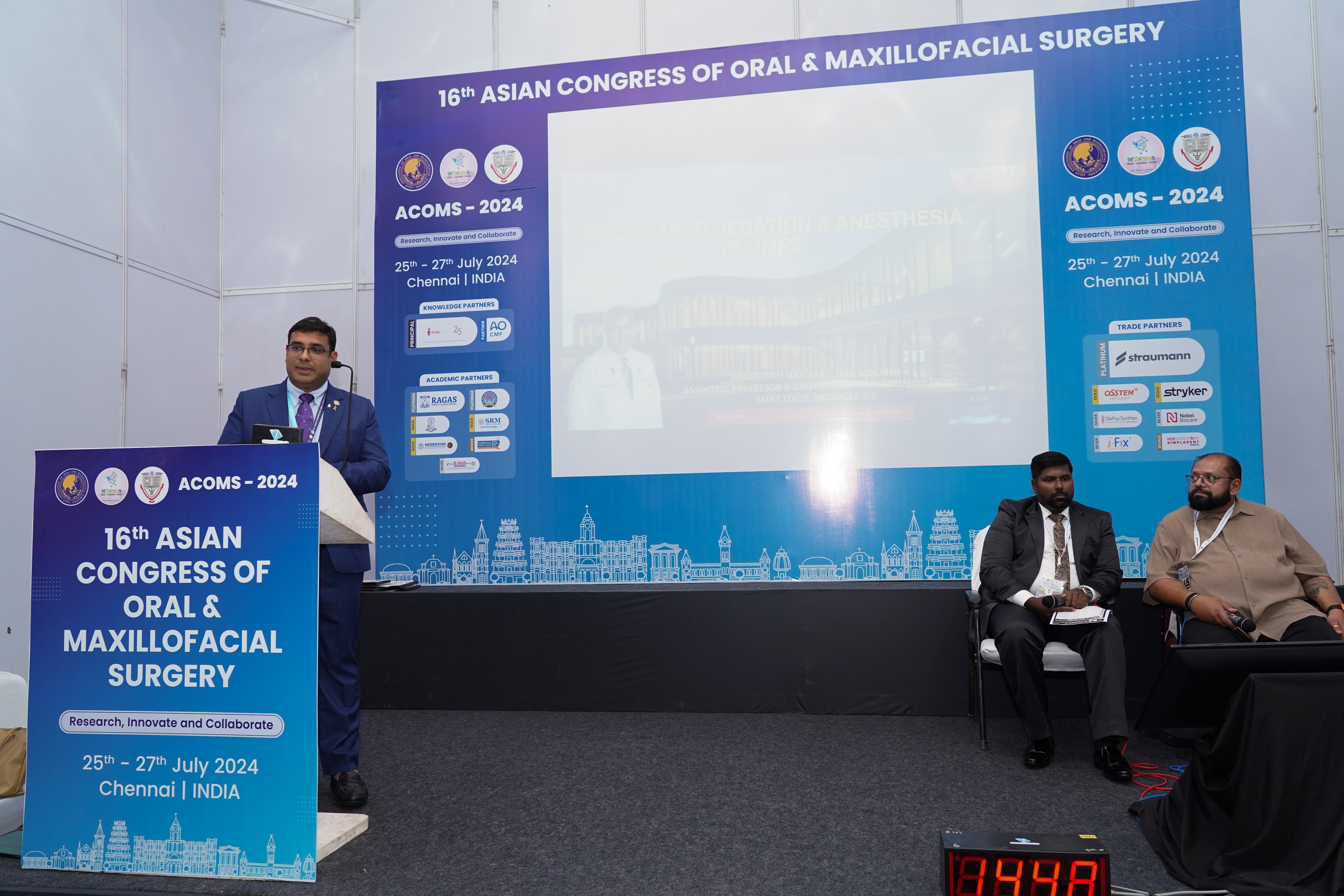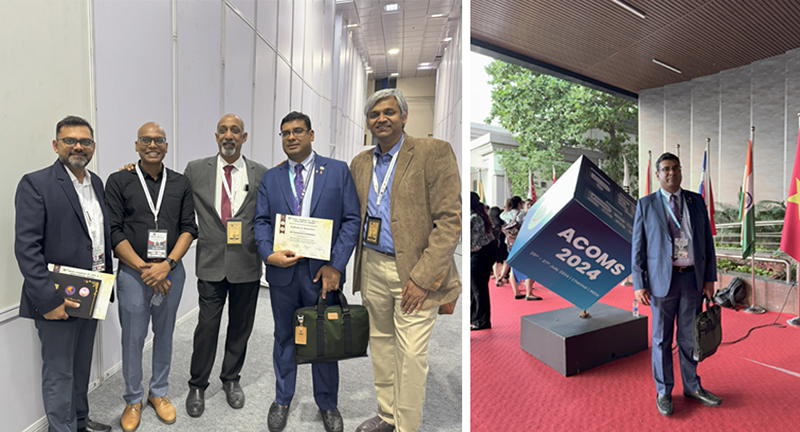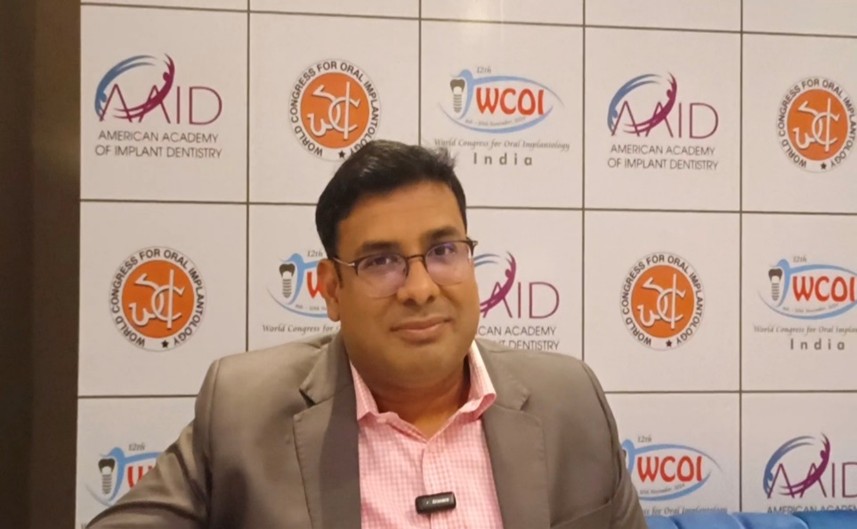
Bulletin of Dental Education Article
Archive
- Bulletin of Dental Education | December 2024, Volume 57, Issue 12
- Bulletin of Dental Education | November 2024, Volume 57, Issue 11
- Bulletin of Dental Education | October 2024, Volume 57, Issue 10
- Bulletin of Dental Education | September 2024, Volume 57, Issue 9
- Bulletin of Dental Education | January 2025, Volume 58, Issue 1
- Bulletin of Dental Education | February 2025, Volume 58, Issue 2
- Bulletin of Dental Education | March 2025, Volume 58, Issue 3
A.T. Still University’s Dr. Prashanth K. Haribabu Is a Key Speaker at International Conferences in India
Prashanth K. Haribabu, D.D.S., B.D.S., M.D.S., M.S.D., Director and Assistant Professor of Oral & Maxillofacial Surgery for A.T. Still University Missouri School of Dentistry & Oral Health (ATSU-MOSDOH) and the St. Louis Dental Center, recently presented at two major dental conferences in India.

Dr. Haribabu was invited to present at the Asian Conference of Oral & Maxillofacial Surgery hosted in Chennai City, India, where he was born and raised. His presentation, “Office-based Sedation & Anesthesia for Oral & Maxillofacial Surgery Patients,” was a unique topic in India and the rest of the world. Unlike the United States, India and some other countries do not sedate or administer intravenous deep anesthesia in an oral surgery office to perform routine oral surgery.

“This was a newer practice concept for them, and a great honor for me to share my U.S. practices,” said Dr. Haribabu.
At the sixth Global American Academy of Implant Dentistry (6GAAID) in New Delhi, Dr. Haribabu was featured as a keynote speaker among stalwarts of implant surgeons from around the world. The 12th World Congress for Oral Implantology Conference was held in conjunction with 6GAAID.
“It was a tremendous honor to receive an invitation to speak among the giants in the field,” added Dr. Haribabu.

Dr. Haribabu shared essential oral health insights, as well as a crucial reminder message for all: Don’t skip those dental checkups!
During an exclusive interview with Correspondent Rohit Shishodia from Drug Today Medical Times (DTMT), Dr. Haribabu explained that oral health isn’t just about keeping your teeth clean—it’s a window into your overall health. He emphasized the fact that dental screenings can sometimes uncover serious, even life-threatening conditions, including cancer, before they become more difficult to treat.
Read the interview below.
DTMT: How is your oral health connected to your overall well-being?
Dr. Haribabu: You might be surprised, but your oral health is a major indicator of your overall well-being. Think about it—your mouth isn’t just where you eat and talk; it’s like a window into your general health.
Simple things like bad breath, changes in your saliva or even the color of your gums can actually be signs of underlying health issues that you may not even know about. These subtle clues often go unnoticed, but they can help doctors and dentists spot potential problems before they become serious. It’s all about connecting the dots! That’s why it's so important for dentists and physicians to collaborate. When something seems off in your mouth, it could be a signal that something's happening in your body and getting to the bottom of it early can make all the difference.
DTMT: Can poor oral health be a sign of non-communicable diseases?
Dr. Haribabu: Absolutely! Poor oral health can sometimes act as a warning sign of what's going on inside your body. It might not directly indicate a specific disease, but it can serve as a marker or a clue to underlying conditions. For example, I recently had a patient with suspicious tissue in their mouth. It looked like it could be cancer, so we did a biopsy, and it turned out to be cancer, but not in the mouth. The source was actually a tumor in the lungs, which had been growing quietly. This is why it’s so important to pay attention to changes in your oral health, as they can often lead to the discovery of something more serious in other parts of the body. It's all connected!
DTMT: What do you think are the main causes of poor overall health?
Dr. Haribabu: Well, the main culprits are smoking and poor nutrition, but there are also medical conditions like diabetes and high blood pressure that play a role. These conditions often lead to reduced oral hygiene, which can then spiral into more problems. On top of that, financial and socio-economic factors come into play. The cost of dental treatment can be a real barrier for many people, especially in places like the U.S., where individuals are sometimes pushed into debt just to afford basic care. So, yes, money definitely impacts overall health.
DTMT: What steps can be taken to ensure comprehensive dental care for everyone?
Dr. Haribabu: It’s a multifaceted approach. It can’t be just one thing. First and foremost, patients need to be aware of how their oral health connects to their overall health. That’s something we, as dental professionals, need to actively educate people about. We also need to expose them to the benefits of maintaining good oral hygiene. And, of course, patients should make a point to visit their dentist regularly, at least once a year, for check-ups.
DTMT: For parents of newborns, what advice would you give to help maintain their oral health?
Dr. Haribabu: According to guidelines from the U.S. (and this is something we follow here in India, too), it’s recommended to take your child to a pediatric dentist before they turn one. It’s never too early to start good oral care practices, and that early visit can help set the foundation for healthy teeth as they grow.
DTMT: When does a patient typically need a dental implant?
Dr. Haribabu: Dental implants are usually needed after a tooth is lost. Most of the time this happens due to infection, cavities, trauma or serious diseases. About 90% of the time, it’s due to one of those factors. In about 5% of cases, people need implants because they were born with missing or fewer teeth.
DTMT: And what can the general public do to maintain good oral health?
Dr. Haribabu: The biggest step is to make sure you’re seeing a dentist at least once a year. Regular checkups help catch potential issues early on, and it’s easier to fix problems before they become bigger, more expensive issues later.
DTMT: Dental implants were once seen as luxury, but things have changed in recent years. What do you think has contributed to the increased accessibility and affordability of dental implants in India?
Dr. Haribabu: Yes, it’s been a significant shift. Companies are offering more affordable pricing and a wider range of options, making dental implants much more accessible across different health care settings. When we look back to 2010, dental implants were seen as something only a few could afford, but today, the situation is much different. With advancements in technology and improvements in accessibility, dental implants are definitely within reach for a broader population, and I’m confident they will only become more affordable as time goes on.
DTMT: What does the future hold for dental implants in India? Do you foresee further improvements in both affordability and availability?
Dr. Haribabu: Absolutely. With continuous advancements in dental technologies and more options becoming available, dental implants will become even more affordable for patients across India. This trend is encouraging, and I believe dental implants will continue to be a great asset to many people in the future.
Courtesy of A.T. Still University Missouri School of Dentistry & Oral Health
Published on March 19, 2025